

Front end. Post bootcamp. Nil?, empty?, blank? in Ruby on Rails - what's the difference actually? The Best Beginner Programming Language. PREP Le Wagon. I spent 3 months applying to jobs after a coding bootcamp. Here’s what I learned. By Felix Feng A less-talked about part of the bootcamper’s journey is what happens after you graduate — when you’re searching for that six-figure developer position.
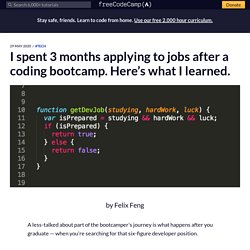
I completed Hack Reactor in July 2016 and took almost 3 months before accepting an offer with Radius Intelligence. I applied to 291 companies, did 32 phone screens, 16 technical screens, 13 coding challenges, 11 on-sites, and received 8 offers. The offers ranged from $60-125k in salary from companies all over the US, and for both front end and full stack roles. In total, 2.8% of applications became offers. Here are 5 things I wish I’d known before I began my job search.
Insight #1: Get through to real people At first, I applied for companies using the shotgun approach. I’d submit a resume for any role that wanted React, Node, or JavaScript experience. Pro-Tip: Find companies using this easy-application repo. My yield was low. Everything changed when one of my cohort-mates, a former recruiter, shared a guide to the job search.
LeetCode - The World's Leading Online Programming Learning Platform. Here's How to Prepare for Tech Interviews : cscareerquestions. Coderust: Hacking the Coding Interview - Learn Interactively. 's Training Camp for Coding Interviews. Now that you've designed a solid abstract architecture, the next step is to take it to scale.
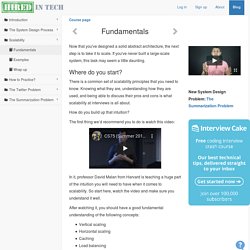
Coderust: Hacking the Coding Interview - Learn Interactively. Programming Interview Questions + Help Getting Job Offers. J-delaney/easy-application: Over 400 software engineering companies that are easy to apply to. I spent 3 months applying to jobs after a coding bootcamp. Here’s what I learned. Ruby-Doc.org: Documenting the Ruby Language. FAQ: Object-Oriented Programming II - attr_reader, attr_writer - FAQ / Ruby FAQ - Codecademy Forums.
Class Person def initialize(name, job) @name = name @job = job endend Once we create an instance, how are we to access the attributes?
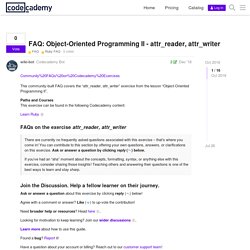
(Remember, they are the ones with the @ prefix.) Notice they have a name/value relation? The pair is together what makes up an attribute. Back to the question of accessing. Billy = Person.new('Billy Jones', 'Marketer') The simple fact is we don’t, not without instance methods to support accessing the attributes. How to Use The Ruby Select Method (With Examples) You can use the select method in Ruby to filter an array of objects.
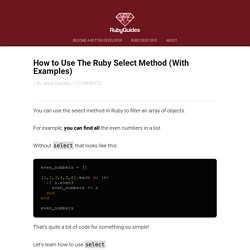
For example, you can find all the even numbers in a list. Without select that looks like this: even_numbers = [] [1,2,3,4,5,6].each do |n| if n.even? Even_numbers << n end end even_numbers even_numbers = [][1,2,3,4,5,6].each do |n| if n.even? I don't really understand what is this yield. In the very simple example you presented, yield doesn’t make much sense indeed.
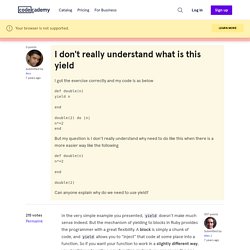
But the mechanism of yielding to blocks in Ruby provides the programmer with a great flexibility. A block is simply a chunk of code, and yield allows you to “inject” that code at some place into a function. FAQ: Hashes and Symbols - Converting Between Symbols and Strings - FAQ / Ruby FAQ - Codecademy Forums. FAQ: Create a Histogram - Sorting the Hash - FAQ / Ruby FAQ - Codecademy Forums. This community-built FAQ covers the “Sorting the Hash” exercise from the lesson “Create a Histogram”.
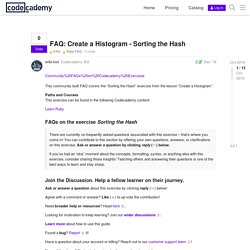
Paths and Courses This exercise can be found in the following Codecademy content: Learn Ruby FAQs on the exercise Sorting the Hash There are currently no frequently asked questions associated with this exercise – that’s where you come in! You can contribute to this section by offering your own questions, answers, or clarifications on this exercise. Join the Discussion. FAQ: Redacted! - Control Flow Know-How - FAQ / Ruby FAQ - Codecademy Forums. FAQ: Loops & Iterators - Loop the Loop with Loop - FAQ / Ruby FAQ - Codecademy Forums. Hello!
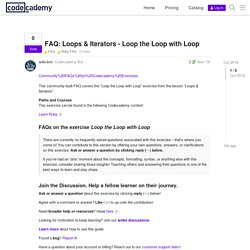
From what I understand, print “Ruby!” Will happen once every time the loop happens. *check if looping condition is true (keeps happening until i == 30, starting with i being 0) *if true, print “Ruby!” *increase i by 1 (at this point, i is 1) *this is the end of loop. *now, back from step 1! If true, print “Ruby!” …and so forth, until at the point that i is 30, by which we would have already printed “Ruby!” Here is a different approach to the question that will give you the same results (I think you were trying to understand the question like this, which is where you might have been thrown off by the solution but at the end of the day, the result is the same x30 “Ruby!”)
Ruby - Operators - Tutorialspoint. Ruby supports a rich set of operators, as you'd expect from a modern language.
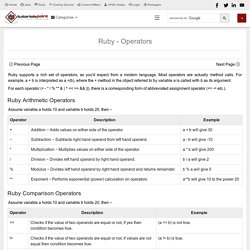
Most operators are actually method calls. For example, a + b is interpreted as a. +(b), where the + method in the object referred to by variable a is called with b as its argument. For each operator (+ - * / % ** & | ^ << >> && ||), there is a corresponding form of abbreviated assignment operator (+= -= etc.). Ruby Arithmetic Operators Assume variable a holds 10 and variable b holds 20, then − Capitalize and capitalize! (i don't quite understand) - Get Help / Ruby - Codecademy Forums. The Basics of Variable Assignment in Ruby. How to Ace a Coding Bootcamp Technical Interview. No matter how much you prepare on your own, demonstrating your technical proficiency can be one of the most daunting parts of applying for a coding bootcamp—especially for students coming from non-technical backgrounds.
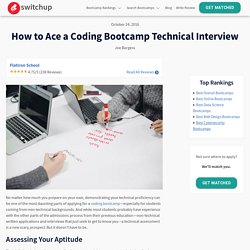
And while most students probably have experience with the other parts of the admissions process from their previous education—non-technical written applications and interviews that just seek to get to know you—a technical assessment is a new scary, prospect. But it doesn't have to be. Assessing Your Aptitude First, let's break down the ways coding bootcamps might assess your technical aptitude. Online coding bootcamps like Flatiron School's Online Web Developer Program look to see that you're making great progress coding on your own, either through our free intro courses or other resources. How to Ace a Coding Bootcamp Technical Interview. How to prepare for Le Wagon coding bootcamp.
Vote on HN So you did your research, compared every coding bootcamp option under the sun and finally decided to attend Le Wagon and you are feeling pretty excited and a little bit scared for what’s to come.
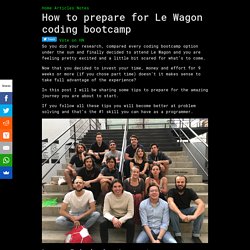
Now that you decided to invest your time, money and effort for 9 weeks or more (if you chose part time) doesn’t it makes sense to take full advantage of the experience? 7 Tips to Nail Your Pre-Bootcamp Interview. So you've finally singled out your favorite coding bootcamp and you're ready to enroll. All those hours spent scouring the web for bootcamp reviews, the most convenient locations, and the most suitable curriculums have led to the registration form in front of you.
You've set aside 3 months for the course, and you've saved up for tuition fees. Coding Bootcamp Interview Questions & Process. Congrats! You’ve just landed your first interview with a coding bootcamp. But, landing the interview is just half the battle. Don’t worry. Le Wagon. If you got here, it means that you have questions about Le Wagon: how to apply, who can join, what you’ll learn… Good! We have the answers :) 1.
Application, Selection, Preparation. Introduction To DevOps.